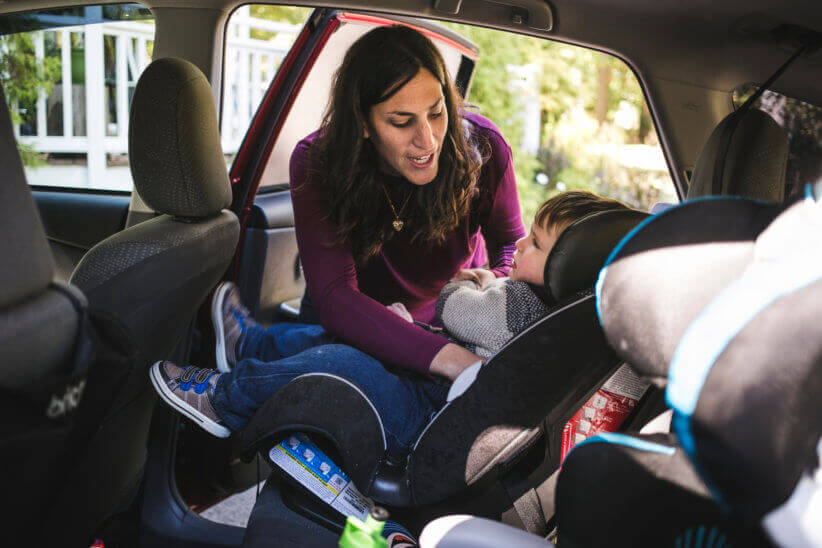Lucy Kaylin, the executive editor of Marie
Claire, is a working mom with two children who has had the same nanny for
almost a decade. Although her new book, “The Perfect Stranger: The Truth About
Mothers and Nannies,” can be read as a primer for parents looking for a nanny,
it is mostly a personal story and a fine read.
Why did you choose to write a book on this
topic?
Part of it is that this is my story. I also
feel that the nanny/mother relationship really is the richest, most complex
partnership imaginable, because you are engaged together in such an important
and intimate project! I also realize that the debate about moms going back to
work or staying at home is raging right now.
Why is that debate so heated?
It is very fraught with deeply personal issues,
and I don’t know that it will ever go away for us, no matter what era we live
in. Even the most well-adjusted, successful woman can feel instantly judged and
undermined in conversations about child care because there is so much at stake
and we have more choice now than ever.
Why are working moms so guilt-ridden?
Guilt, ambivalence and denial come from not
adjusting wholeheartedly to the choices that you’ve made. With myself and other
women, it always seemed to me that when we were feeling that guilt, it meant we
were not 100% “there” with the choices that we had made.
Your last book, “For the Love of God,” is about
nuns. So you’ve written about two classic female roles, each with a strong
feminist undercurrent.Did these subjects come to you organically, or are they
part of a bigger message you are trying to convey?
I was working at GQ when I started and
finished “For the Love of God,” and I started this book while I was there. A
lot of my professional life was caught up in men’s issues, and there were all
sorts of things I cared about in women’s lives that didn’t get addressed in my
day job. I do think there is a connection, and I am very taken with the idea of
women trying to figure out what constitutes a rich, worthy, well-lived life.
Much of your new book is dedicated to how
working affects your home life, but what about how home life affects your work?
My boss said to me when I started working
again, “You’re not back yet,” and I had been physically back for two months! I
thought that was probably pretty astute on his part. Without question, it’s
hard. You are always going to disappoint someone, whether it’s your child or
your husband or your boss. I’m on top of the big things, but the little
things—the $5 in an envelope, the form I didn’t fill out—can be painful when
you realize what you forgot, but that doesn’t make it bad or the wrong choice.
I think the fact that I work makes me a better mom. My kids get a kick out of
the fact that I work! I think I am a more compassionate and nurturing person at
work, and that comes from being a mother.
What advice do you have for a new mom embarking
on the nanny process?
I think some women do this in a
less-than-wholehearted way because they are not committed yet to what they are
doing, and they are not thinking about the nanny as a full-time employee who
will be with the child 10 hours a day. Women have to get clear with themselves
that this is an employer/employee situation, and this is not someone looking in
on your kid for a couple hours or a member of the family. A nanny is a woman
who needs to be compensated with a fair wage for a job, and it all sounds harsh
and professional, but you will be grateful down the road for the
professionalism that you get in return.
What specific questions do people often fail to
ask when interviewing a prospective nanny?
Marital status and with whom they live! Does
she have a health plan? A husband with a health plan? If she lives alone, are
you willing to kick in for her health benefits? What about the sick leave
she’ll need if she falls ill?
Is it good to have a trial day?
I think it’s a good idea, because what makes
this job different from any other position is that unlike hiring an assistant,
you’re not going to see your nanny for 90% of her job. So although it can be
excruciatingly awkward to go around with a nanny candidate who is pushing your
child in a stroller, it’s not a bad idea for you to see how she does these
things.
You talk about “nanny cams” and women who try
to be involved by “parenting remotely,” but where do you draw the line?
Every mom has to figure out what her comfort
level is with this stuff. I think it’s very important not to dictate to anyone
the right way or the wrong way to run a relationship with a nanny. That said, I
do think you have to let the woman do her job. She needs to be able to exercise
judgment, and if you are constantly second-guessing her, I don’t think that
will lead to a healthy situation for anybody.
Why do we expect our nannies to be perfect?
I do think it is unrealistic for us to expect
perfection, but I understand why people do, because we’re dealing with our
children, and doing something less than perfect could be catastrophic. And how
ironic we’re expecting perfection from these women who aren’t even paid all
that well! Their lives are a lot harder than ours—they haven’t had the comforts
or advantages we’ve had—yet they are the ones who are supposed to be perfect at
their job.
You have a good relationship with your nanny,
but there must be some issues where you clash. How do you deal with it when you
don’t like something your nanny does?
In the book I talk about how I feel that our
nanny has a different aesthetic than I do for our children. She’s all about the
starchy and new, and I’m about sweatpants and T-shirts, but at a certain point
I realized that you have to be able to let some stuff go. You have to pick your
battles. No one is getting hurt if my daughter is wearing a dress I don’t like.
How do you make sure you are not exploiting
your nanny?
I think it’s a bad idea to ask your nanny, “Is
this OK?” The really tricky thing about this relationship is that it’s got this
intensely familial aspect; if things are going well, you are inevitably going
to utter the phrase, “It’s like she’s family.” But there really is this
contradictory element of professionalism and this woman has bills to pay. You
love the fantasy that she’s there the way that family can pop in, or that she
would do it for free, but even though our nanny is stoic and uncomplaining,
there is this extravagant relief I see in her when I give her the day off. She
loves my children, but it’s a job.
Is it fair to ask your nanny to play a kind of
academic role with your children, like teaching them a foreign language she
knows?
People want their nanny to be able to do the
feeding, clothing, ferrying, cleaning, shopping and now foreign language
instruction. I think it is very important for people to not overload these
women, because it’s exhausting! If you’re having your nanny do two or three
jobs, then you have to pay accordingly.
How do you tell your kids their nanny—their
surrogate mother—is leaving?
When children just don’t need a nanny
anymore, I think in the best of worlds everyone tries to maintain a
relationship because you have a lot of history together and you’ve been through
a lot together, but the nanny isn’t comfortable if the job is dwindling down to
nothing. I’ve heard many times in interviews that the nanny anticipates this
and gets a new job on her own because she wants a situation that’s got a
future, and when she’s caring for a 12- and a 14-year-old, that’s a situation
on its last legs.
There is a new book out called “The Manny,” and
I recently read an interview with a male nanny What do you think about male
nannies?
I think it’s kind of a neat idea. If my husband weren’t around I would have to think seriously about importing some male energy for my son, because he really responds to that.





















